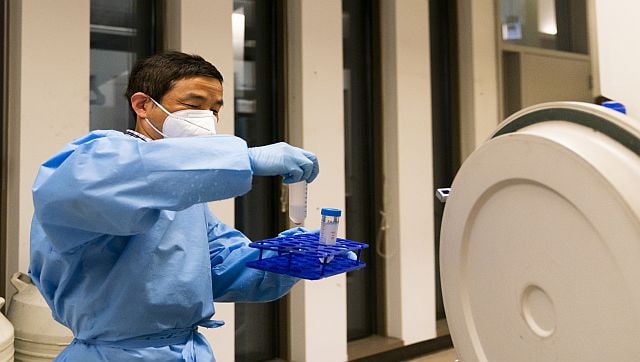Cancer patients in England will benefit from faster cancer treatment thanks to the approval of a vaccine that can be administered in as little as seven minutes. Britain’s state-run national health service will be the first in the world to offer an injection that treats cancer to hundreds of patients in England which could cut treatment times by up to three quarters. Following approval from the Medicines and Healthcare products Regulatory Agency (MHRA), NHS England said on Tuesday hundreds of eligible patients treated with the immunotherapy, atezolizumab, were set to have “under the skin” injection, which will free up more time for cancer teams. “This approval will not only allow us to deliver convenient and faster care for our patients, but will enable our teams to treat more patients throughout the day,” Dr Alexander Martin, a consultant oncologist at West Suffolk NHS Foundation Trust said. [caption id=“attachment_13060762” align=“alignnone” width=“640”] Research scientist Kevin Potts uses a multichannel pipette to dissociate ovarian cancer cells with the enzyme trypsin at UW Medicine’s Cancer Vaccine Institute, in Seattle. AP[/caption] NHS England said atezolizumab, also known as Tecentriq, is usually given to patients intravenously, directly into their veins via a drip, which could often take around 30 minutes or up to an hour for some patients when it can be difficult to access a vein. “It takes approximately seven minutes, compared with 30 to 60 minutes for the current method of an intravenous infusion,” Marius Scholtz, Medical Director at Roche Products Limited said. Revolutionising cancer treatment Atezolizumab — made by Genentech, a Roche company — is an immunotherapy drug that empowers a patient’s own immune system to seek and destroy cancerous cells. The treatment is currently offered by transfusion to NHS patients with a range of cancers, including lung, breast, liver and bladder. NHS England said it expected the majority of around 3,600 patients starting the treatment of atezolizumab every year in England to switch onto the time-saving injection. But added that patients receiving intravenous chemotherapy in combination with atezolizumab may remain on the transfusion. [caption id=“attachment_13060732” align=“alignnone” width=“640”]
 Research scientist Yi Yang retrieves samples at UW Medicine’s Cancer Vaccine Institute in Seattle. AP[/caption] The drug is known as a checkpoint inhibitor, and it works by assisting the immune system in locating and killing cancer cells. Clinical trials have indicated that after surgery and treatment, atezolizumab can lower the risk of cancer recurrence or mortality by 34 per cent in patients with early-stage non-small cell lung cancer. The novel medication works by inhibiting a protein that prevents the immune system from attacking cancer cells and makes cancer cells more apparent to the immune system. The addition of three approved organisations to the UK’s capacity to certify medical devices was also revealed on Tuesday. The expansion is intended to nearly double existing capacity, giving patients access to more effective products. Dr Laura Squire, the MHRA chief healthcare quality and access officer, told the Guardian: “By almost doubling capacity for medical device assessment in the UK, we’re supporting patients to access the safe and effective products they need to protect their health.” With inputs from Reuters
Research scientist Yi Yang retrieves samples at UW Medicine’s Cancer Vaccine Institute in Seattle. AP[/caption] The drug is known as a checkpoint inhibitor, and it works by assisting the immune system in locating and killing cancer cells. Clinical trials have indicated that after surgery and treatment, atezolizumab can lower the risk of cancer recurrence or mortality by 34 per cent in patients with early-stage non-small cell lung cancer. The novel medication works by inhibiting a protein that prevents the immune system from attacking cancer cells and makes cancer cells more apparent to the immune system. The addition of three approved organisations to the UK’s capacity to certify medical devices was also revealed on Tuesday. The expansion is intended to nearly double existing capacity, giving patients access to more effective products. Dr Laura Squire, the MHRA chief healthcare quality and access officer, told the Guardian: “By almost doubling capacity for medical device assessment in the UK, we’re supporting patients to access the safe and effective products they need to protect their health.” With inputs from Reuters
Britain’s national health service will be the first in the world to offer an injection that treats cancer to hundreds of patients. The therapy, known as atezolizumab, will treat different types of cancer, including lung, breast, liver and bladder
Advertisement
End of Article


)

)
)
)
)
)
)
)
)



